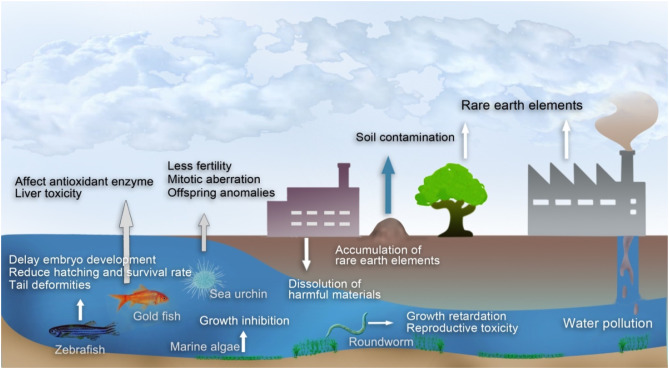A-level Biology

Rare earth elements (REEs) are used increasingly often in innovative technologies, causing these elements to enter the natural environment [1]Link opens in a new window. The extensive usage of REEs in different industries may eventually lead to severe contamination of the surrounding environment, agriculture, aquatic fauna, and soil, which might, in turn, cause severe damage to human health. Different studies were conducted to evaluate REEs’ toxicity effect in soil, water, model organisms, and humans working in close collaboration with the REEs field mentioned in recent times [2]Link opens in a new window.
Many research groups are studying the toxicity effects of different REEs due to REEs’ persistence in the environment for a long time. A group of researchers highlighted the use of local Moran’s I test in assessing the spatial statistical analysis of REEs contamination, especially in the hotspots of urban soil. They indicated that REEs enrichment in urban soils might occur due to the complex metal recycling sources, waste disposal, agricultural practices, and vehicular emission [2].
Rare Earth Elements Education Resources for Biology
Spark- ‘The Environmental Struggle Over Rare-Earth Elements For A Green Future’.
China Wrestles with the Toxic Aftermath of Rare Earth Mining
Room to Manoeuvre? Mining, biodiversity and protected areas
The Race Is On to Mine the Deep Sea—But Scientists Are Wary
Mining Rare-Earth Elements from Fossilized Fish
Toxic and radioactive: The damage from mining rare elements
A Climate Solution Lies Deep Under the Ocean—But Accessing It Could Have Huge Environmental Costs
Another blow to troubled Madagascar rare earth mine
Troubled firm aims to mine Madagascar forest for rare earth elements
Boom in Mining Rare Earths Poses Mounting Toxic Risks
Rare earth elements and old mines spell trouble for Western U.S. water supplies
Here, we summuarized education resources for teaching Rare Earth Elements in the Biology course in the following examboards:
Assessment and Qualifcations Alliance (AQA)
Biology (AS 7401) (A-Level 7402)
Topic 3.7.4: Populations in ecosystem (natural resources conservation and sustainability management)
EDEXCEL
Biology A (Salters-Nuffield)
Topic 5.15: Climate change
Topic 5.22: Sustainability and natural resources
Biology B
Topic 10.4: Human effects on ecosystems (Include climate change)
Oxford, Cambridge and RSA Examinations (OCR)
Biology (H020, H420)
Module 4.2: Biodiversity (Climate change)
Module 6.3.2: Population and Sustainability (Ecosystem, environmental resource management, and sustainability)
Assessment and Qualifcations Alliance (AQA)
https://www.aqa.org.uk/
EDEXCEL
https://qualifications.pearson.com/en/home.html
Oxford, Cambridge and RSA Examinations (OCR)
https://ocr.org.uk/
